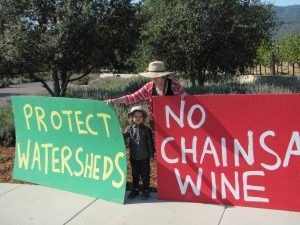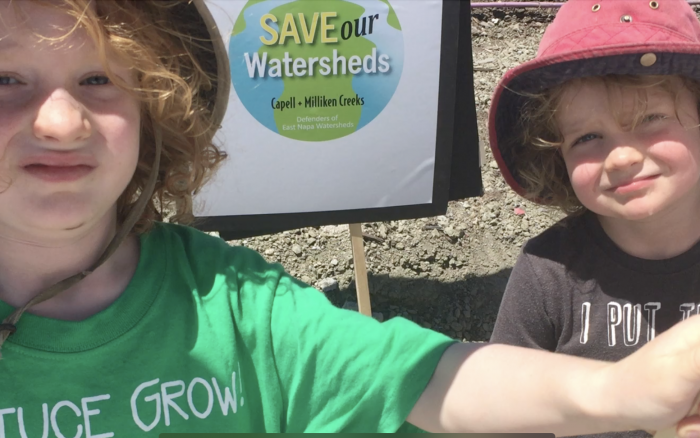Was 2014 only my awakening to the need for environmental activism in Napa County, or was it also a considerable citizen shift in consciousness?
2014 was the year Walt Ranch hit the public eye. I learned about Walt Ranch only when I sought help after new neighbors decided to plant vines in an ancient oak savanna we share and upon which, with the former neighbor, we had placed a protective tree easement. I learned this threat to the forests and oak woodlands was happening all over the county and that others were organizing to protest impending development threatening the environment and community. In early 2015, some 13 citizen groups met at the Marriott in Napa, pledging to work together. It was one of the great silver linings for me of this period, meeting some of the brightest and most thoughtful people of our county, many of us retired. I think of this as the highest and best use of elders. Fruits of Eden: Field Notes: Napa Valley 1991-2021 was inspired by these people and this work.
“Walt Ranch is the epicenter of the biggest local environmental fight of recent memory,” Nancy Tamarisk writes in a Napa Sierra Club Group newsletter this month. “For nearly a decade, starting in 2014, Sierra Club led the vigorous opposition to this project, which outraged a large segment of the Napa community, invigorating such organizations as Napa Vision 2050 and Defenders of East Napa Watersheds (DENW). The fight created a network of trusted allies which still exists.”
Walt Ranch was the catalyst that brought many of us onto the streets. The project was massive: 2300 acres of wildlands, a biological hotspot, a wildlife corridor, and 28,000 mature trees at risk for 35 blocks of vineyard. For months and years, we protested before the leaping chrome rabbit glaring in the sun just south of St. Helena. When weekend guests came, I enlisted them to join us, holding signs, Chainsaw Wines. Halt Walt. Protect Rural Napa. My grandson Wesley’s favorite? Protect trees. My husband could still join us as we stood in the hot midday sun by Hall Winery or in front of the County Administration Building during hearings for the project. We packed the Board of Supervisors and Planning Commission chambers, lined up for hours of public comment, practiced for the 3-minute limit, and hired water, wildlife, and fire experts. Our numbers spilled into the overflow rooms of the building. Through years of hearings, appeals, and court action, the project was reduced to 14,000 mature trees with new mitigations for greenhouse gas emissions.
Ultimately, it was not the county who acted to protect our wild lands and watersheds, but the Halls, probably deciding this was no longer a good business decision. Let’s be clear: this is business as usual, not a governmental shift toward an ecological ethic. This is also true of a second big win this year, the county’s being forced by the courts to rescind the use permit for Mountain Peak Winery, which is now up for sale.
Business-as-usual is deadly. Why do we not yet realize this? We are no longer in a time we can proceed as we have for the last 200 years. Fossil fuels have warmed our planet, and we are in unprecedented climate chaos, resulting in non-linear heating. Forests and oak woodlands are our easy and greatest partners, sequestering and holding carbon within their roots, trunks, and branches. We cannot afford to kill trees for anyone’s dream of a vineyard or any other development.
“We believe our environmental activism helped to depress the potential profit of Walt Ranch by decreasing the project acreage, adding costly greenhouse gas mitigations, and imposing delays and legal fees,” Tamarisk writes. “What else was achieved by our campaign to save Walt Ranch? At the very least, potential developers of Napa’s hillside watersheds were put on notice that environmentally unsound projects would face vigorous, expensive and prolonged opposition, resulting in delayed and diminished profits, and bad press. Developers were also reminded of the need to consult with the community early in their process to address concerns.”
Yes, there are enormous wins in the last few years. Two of the biggest projects have been stopped, not by our county’s concern for the environment and community, but by the network of citizens organized to protect our watersheds, forests and oak woodlands, and our community. Even if the decisions were for business reasons, the projects were stopped.
It is a new time. We have two new supervisors and will soon have a new CEO. Now let’s work with our Board of Supervisors and County Government to effectively and substantially recognize the stakes of climate chaos and the fact that if we do not champion the rights of ecosystems, we threaten our human existence on the planet.

